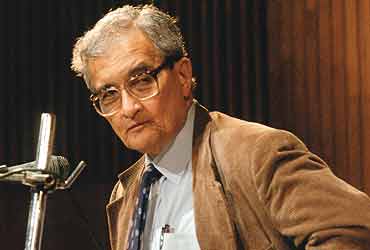
The prominent economist also criticised Modi's model of governance saying he did not approve of it.
"Yes, I don't want him," Sen told CNN-IBN in reply to a question on whether he wanted him as his prime minister.
"As an Indian citizen I don't want Modi as my PM... He has not done enough to make minorities feel safe," he said.
On being asked why he did not want so, Sen said, "He could have first of all been more secular and he could have made the minority community feel more secure."
"No, I don't approve of it... I don't think the record is very good. I think I don't have to be a member of the minority in order to feel insecure... We Indians don't want a situation where the minority feel insecure and could legitimately think that there was an organised violence against them in 2002.
I think that is a terrible record and I don't think Indian Prime Minister as an Indian citizen... Of who has that kind of record. No, I do not."
Sen said physical infrastructure in Gujarat may be good but Modi has not done enough for minorities or for the majority. He also said that the Gujarat model needs to do much more on the health and education sectors and bring equity.
He said Modi could have made the majority community feel that they are not maltreating the minority and going against the long Indian tradition of being tolerant.
"He could have also taken both of the facts that Gujarat record in education and healthcare is pretty bad and he has to concentrate on that... as much as he is concentrating quietly as it has happened on physical infrastructure," the Nobel laureate said.
BJP recently anointed Modi as chairman of its election campaign committee.






Comments
Add new comment